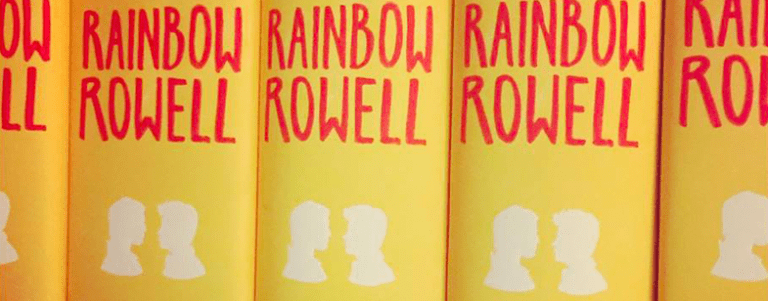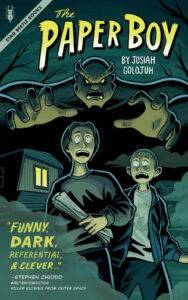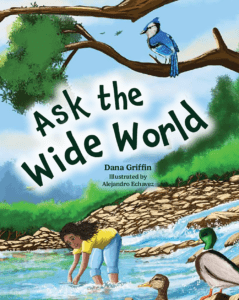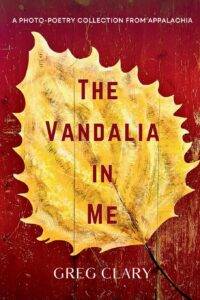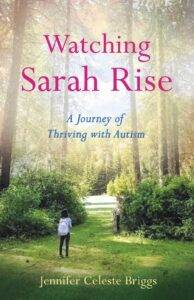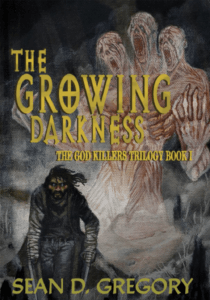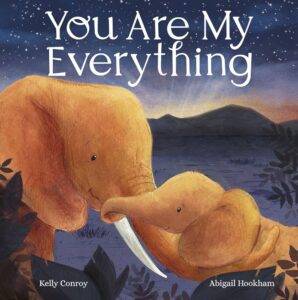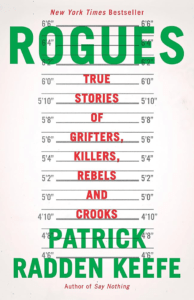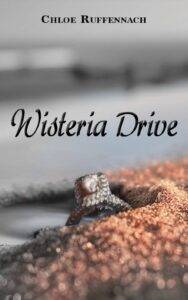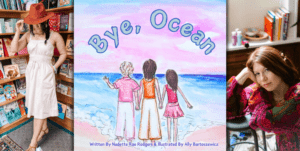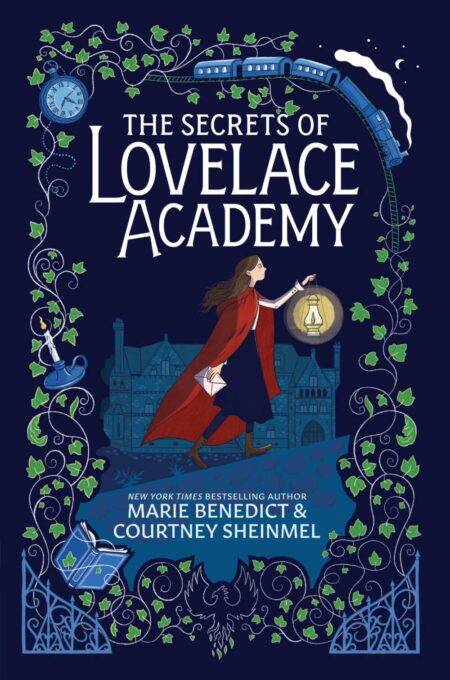Littsburgh is thrilled to be able to share with you an interview with Rainbow Rowell by the youngest member of our literary roster, eleven-year-old Grace Randall. Grace has recently interviewed Gregory Maguire, Andrea Davis-Pinkney and Littsburgh’s Nick Courage. Check out her site, The Authors Among Us, for more!
“When I’m writing my own stuff, it’s like swimming upstream. Or… falling down a cliff and grabbing at branches, trying to invent the branches as I fall.” (Fangirl by Rainbow Rowell)
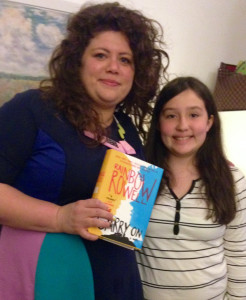 I met with novelist Rainbow Rowell in the green room at the Carnegie Lecture Hall on October 8th to discuss her work, especially her newest book, Carry On, which was released on the 6th. She was wearing a very funny pink necklace in the shape of an 80s-style Slimline phone (shown in the picture to the right). Carry On is Ms. Rowell’s first fantasy novel, and possibly not the last. It is a spin-off of one of her hit young adult (YA) novel Fangirl, a book about a college-aged fan fiction writer and her freshman year. The girl in question, Cath (short for Cather), writes fan fiction stories about a Harry Potter-esque magician named Simon Snow, and his roommate, Tyrannus Basilton “Baz” Grimm-Pitch. Rowell delved much deeper into Simon and Baz in Carry On, a real-life novel version of Cath’s “fanfic.” Ms. Rowell weaves a new type of magic throughout the story, and has more than enough mystery and nail-biting moments of “What’s going to happen!” for any lover of puzzles.
I met with novelist Rainbow Rowell in the green room at the Carnegie Lecture Hall on October 8th to discuss her work, especially her newest book, Carry On, which was released on the 6th. She was wearing a very funny pink necklace in the shape of an 80s-style Slimline phone (shown in the picture to the right). Carry On is Ms. Rowell’s first fantasy novel, and possibly not the last. It is a spin-off of one of her hit young adult (YA) novel Fangirl, a book about a college-aged fan fiction writer and her freshman year. The girl in question, Cath (short for Cather), writes fan fiction stories about a Harry Potter-esque magician named Simon Snow, and his roommate, Tyrannus Basilton “Baz” Grimm-Pitch. Rowell delved much deeper into Simon and Baz in Carry On, a real-life novel version of Cath’s “fanfic.” Ms. Rowell weaves a new type of magic throughout the story, and has more than enough mystery and nail-biting moments of “What’s going to happen!” for any lover of puzzles.
My first question to Rainbow Rowell (and yes, that is her real name) was, “Why do you think fan fiction writing and/or reading appeals to so many people?” To answer the first part of the question, she said that she thinks it is appealing because when people really love a story, and then it just ends, they want it to keep going. “Certain kinds of brains are storytelling brains, and those with storytelling brains just keep going after the story ends, they keep thinking about the world.” I also asked whether or not she approved of fan fiction of her own work. “I completely approve of fan fiction of my own work,” she replied. She went on to explain that it was really quite flattering that people liked her work so much that they felt inspired to create their own pieces of art and writing set in her worlds and with her characters. “I don’t read fan fiction of my own work, because it messes with my head,” she added, inducing a laugh from those of us that were in the room, “but I’m glad people are writing it.”
I then turned the conversation westward to her hometown of Omaha, Nebraska. My question was, “There are a lot of stereotypes about Pittsburgh, i.e. grimy air from the steel mills, ash everywhere, clouding the skies and such, and I know that they aren’t true. You set most of your books in, near and around Omaha, which has its own stereotypes, i.e. it’s rural, there’s lots of agriculture, etc. Do you do so to paint a picture of the real Omaha and discredit the clichés that some have?” Her answer both surprised and amused me. “I don’t think anyone thinks about Omaha unless they live there,” she said. “Honestly, I didn’t know that many bad things about Pittsburgh. I think it’s really only the people inside of it that worry about how they appear.” She continued to explain this by telling me why she really set her books there, “I set them there because it’s what I know best. It’s where I’ve lived most of my life, where I work… I feel the most confident writing about the people of Omaha.”
To conclude the interview, I asked Ms. Rowell, “What advice do you think Cath would give to other young writers?” She replied saying, “Actually, I don’t think Cath would ever want to give anyone advice!” she said, prompting more laughter from those of us in the small room. Her character of Cath is an extremely self-conscious writer who doesn’t really know what to do with herself, and so the last thing that she would ever want to do would be to give advice to another writer. Rowell explained that, “The advice I give to young writers is to read and write a lot, and to give themselves time. You don’t really become a master, or even adept at something until you’ve done it a lot, so I would say be patient with yourself, don’t expect to be peaking at fifteen. You could be writing at fifteen, but give yourself time to get better.”
Rainbow Rowell continued to impress the larger audience during the lecture following the interview. Her intelligence, talent, and humor made it easy for someone who has never even read her work to understand how she has become such a big success. Ms. Rowell is a great role model for any young writer, as she tells us to wait. Keep writing and reading, but be patient. You won’t peak at fifteen, none of us will, but when we do, it may be the culmination of all we’ve ever worked for.
Until then, carry on.
To learn more about Rainbow Rowell, and the optioning of her YA novel, Eleanor & Park, by DreamWorks (screenplay by Rainbow Rowell) click here.
Grace Randall
10/11/15
This review reprinted here by permission of the author and The Authors Among Us.


